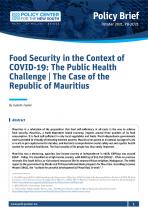Food Security in the Context of COVID-19: The Public Health Challenge | The Case of the Republic of Mauritius
Mauritius is a refutation of the proposition that food self-sufficiency at all costs is the way to achieve food security. Mauritius, a trade-dependent island economy, imports around three quarters of its food consumption. It is food self-sufficient in only local vegetables and fruits. Post-independence governments have succeeded in virtually eliminating extreme poverty. Mauritius has grown at an annual average of 5.3% or 4.4% in per-capita terms for decades, and has built a comprehensive social safety net and a public health system for universal healthcare. The food security of its people has thus vastly improved. Mauritius was a monocrop, agrarian, low-income country at independence in 1968: GNP/cap was around $260 . Today, it is classified as a high income country, with GNP/cap of $12,740 (2019) . It has no precious minerals like South Africa, or rich natural resources like its nearest African neighbor, Madagascar. The 1960 report to the government by Meade and Tittmuss held out bleak prospects for Mauritius. According to James Meade (1961), the “outlook for peaceful development [of Mauritius] is weak”










